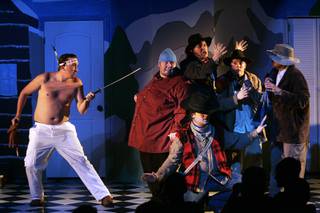Friday, Aug. 21, 2009 | 2 a.m.
Sun Coverage
Sun Archives
Something funny happened at the theater the other night. But it wasn’t on the stage.
Last Friday, during an early performance of “Cannibal! The Musical” (which I reviewed in Wednesday’s Sun), I began to notice laughter and applause out of any rational proportion to what was happening theatrically.
So boisterous and loud were the five men and women sitting in front of me that I moved to the back of the house so I could hear the actors over their shrieking and hooting. (I wasn’t the only one who changed seats.) I occasionally monitored the audience for responses during the show, and easily identified three noticeable clusters of suspicious over-reactors. The rest of the crowd responded more or less normally.
It certainly wasn’t the first time I’ve witnessed this phenomenon of faux-applause, in which part of the audience seems to be in on the act.
But it’s not usually so obvious. And it was all the more obnoxious because of it.
It’s called a claque — think of it like a living laugh track or embedded cheerleaders.
Professional applauders
The term comes from the French word for “to clap,” and refers to the common practice and long history of professional applauders at theaters and opera houses dating to 4 B.C. Athenian playwright Philemon frequently defeated Menander in comedy competitions at the theater of Dionysus — not because his jokes killed, but because he swayed the judges by packing the seats with loudly laughing compatriots.
The claque is certainly not foreign to politics, either, as evidenced by the crowds at recent health care town-hall meetings. The Roman emperor Nero was accompanied on speaking tours by a claque of 5,000 knights and soldiers, applauding by executive order.
In the 19th century heyday of the practice, a manager of a Parisian theater or opera house would order up any number of claqueurs from an agency. And the claqueurs started to specialize: Some judged where claqueurs would be most optimally placed (near critics, for instance), others laughed loudly at every joke, others were good at faking tears, and last but least were those who leapt to their feet, demanding ovations and encores.
Ethan Mordden’s witty “Fireside Companion to the Theatre” details one such preplanned claque-attack on an opening night.
“At the first night, I led the attack myself 33 times,” wrote the head claque. “We developed three acclamations, four hysterias, two portions of frisson, four encores of applause, and two interminable explosions.”
The phenomenon eventually revealed its dark side — extortion and sabotage — and singers were sometimes warned to pay up in order not to get booed.
A form of insurance
The subject of claques brings up an uncomfortable truth, which is that audiences en masse are easily led, often uncertain of how to respond without external cues. Many a comedy has played to quiet crowds until the reviews come out pronouncing it “hilarious!” and “uproarious!” A padded audience may serve as a sort of insurance for a nervous producer.
I’ve noted this phenomenon previously in print, and have been subsequently accused of “reviewing the audience,” which is often followed by, “Didn’t you notice everyone else laughing?” and “Did we see the same show?”
There’s really no way to prove that a claque has infiltrated a show, although one dead giveaway last Friday night was the cluster of laughing-till-they-cried guys sporting “Cannibal!” T-shirts.
Thinking more generously, a contemporary claque is likely made up of loyal and supportive friends and fans of the performers.
But perhaps the theater companies involved might consider offering a brief acting seminar for their opening audiences, coaching them in convincing, realistic laughter, not braying and spraying.
If you’ve got good stuff, you don’t have to fake it to make it.


Join the Discussion:
Check this out for a full explanation of our conversion to the LiveFyre commenting system and instructions on how to sign up for an account.
Full comments policy